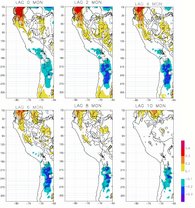CENSOR

Climate variability and El Nino Southern Oscillation: Implications for natural coastal resources and management
The El Niño Southern Oscillation (ENSO) strongly influences marine biodiversity and the sustained exploitation of marine resources at the Chilean and Peruvian coastline. The warm phase (El Niño) and cold phase (La Niña) cause differences in the upwelling Humboldt Current and have both positive and negative socioeconomic, ecological and infrastructural implications in those and other countries. The objective of the CENSOR project is to enhance the detection, compilation and understanding of ENSO variability on coastal environments and resources.
To achieve this goal, CENSOR pursues a multidisciplinary approach, including research on coastal benthic communities, pelagic-benthic processes, continental riverine input to the coastal system and ecophysiological constraints and aquacultural demands.
The particular objectives of the CENSOR work package at GFZ Potsdam are:
- Quantification of the continental hydrological cycle for the Pacific river basins of Peru and Northern Chile
- Set up of a large-scale hydrological water balance model for the entire study area, based on WASA (Model of Water Availability for Semi-Arid Environments) (Güntner & Bronstert, 2004)
- Estimation of freshwater transport from the continental area to the coastal marine ecosystem
- Analysis of the variability of the hydrological behaviour as a function of ENSO


